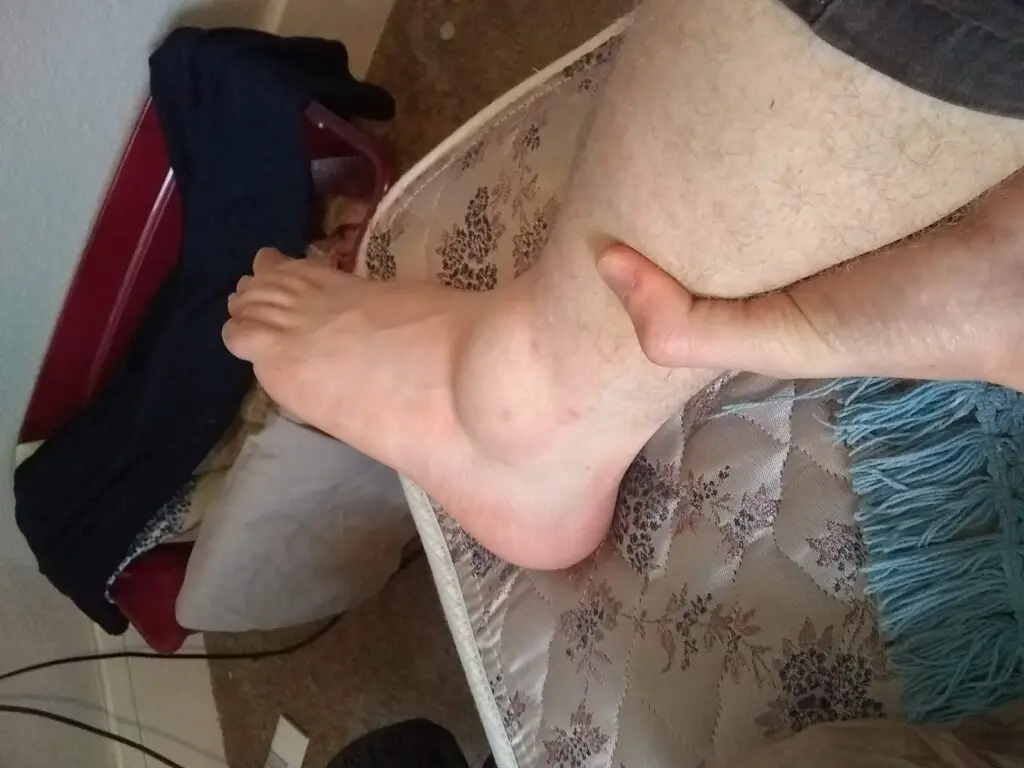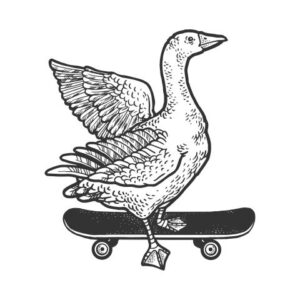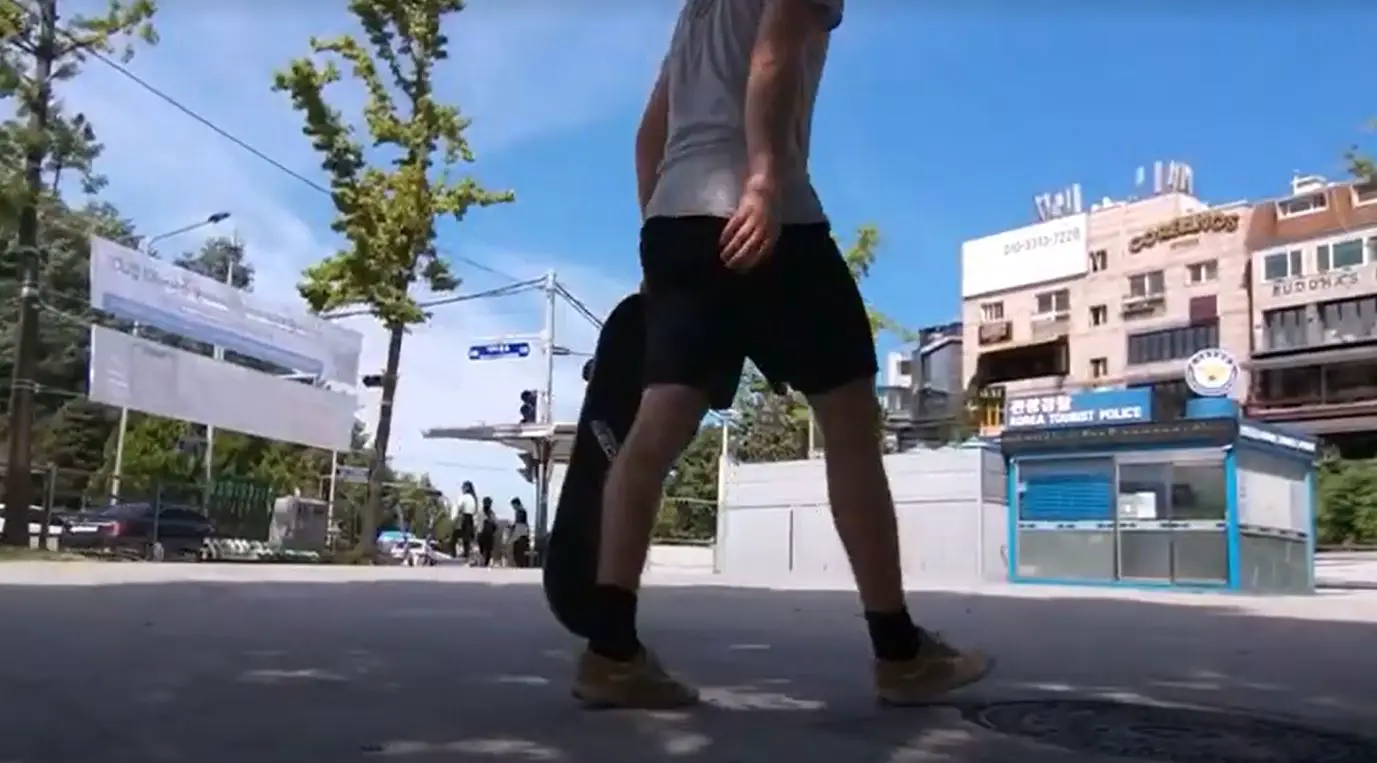Everyone likes to watch progressions so that they can compare their progression, get inspired, or just to waste time on the internet.
I figured I would try to describe completely how I progress with some video clips and explain how fast you should expect to progress.
Keep in mind I don’t have many video clips from when I just began skating. I figured I sucked so why should I video myself. Now I wish I did.
How Fast Will I Progress Skateboarding?
Progression is fun to track but isn’t something you should solely focus on while you skate. Enjoy the process of just skating because often progress can be hard-won in skateboarding.
How fast you progress on a skateboard depends on how often you practice and your natural ability. However, skateboard progression almost universally takes longer than people think. Over 60% of new skaters need a month or more to learn how to ollie. Skateboarding’s learning curve is steep, and it is likely that you will still feel like a beginner skater after your first year of skating.
Almost every single person who starts skating doesn’t realize how long it takes to actually progress. Skateboarding has a brutal learning curve and takes a long time to progress. There are people who have been skateboarding for years and still can’t kickflip for instance.
There are also people who take months to learn how to ollie. 45% of new skaters take 3 or more months to learn an ollie. (source)
So don’t focus on your progression too much or you will get frustrated quickly. There are days when you will have a hard time landing anything and you will feel like you simply aren’t progressing at all.
How Long Does It Take An Average Person to Learn to Skateboard?
This is honestly a terrible question.
There is no average time it takes someone to learn how to skateboard and it varies so much from person to person. If you consider learning to skateboard as riding around and cruise, then the average person can learn this in 2 days to 2 weeks. If you consider learning to skateboard as learning tricks and skating transition, then the average person will takes months to even years to learn.
It all depends on how often you skateboard and how quickly you naturally learn. Some people pick it up somewhat quickly and others struggle to balance on the board even after weeks of practice.
If you’re curious about how long you should practice each week to progress, check out my article where skaters respond with how often they think you should practice.
My Skateboarding Progression As An Adult
Where I Started
I skated originally in elementary school and middle school, but could only sort of ollie. Once my friend quit skating, so did I.
I started again at the age of 25 and basically had to start from nothing. I could push and balance on my board pretty well and could actually ollie while stationary, but nothing else. I couldn’t ollie while moving and had awkward sudden kick turns.
I was an absolute beginner or at most a few weeks ahead of an absolute beginner.
Unfortunately, because I sucked, I didn’t want to video myself so I really don’t have any videos from this time. The only clip I have is actually from about 2 or so months after starting again and it’s me doing an ollie down a two stair. Right before spraining my ankle.
Injuries
1st Bad Ankle Sprain

Just a couple of months after starting again and finally getting my moving ollie down, a tried to ollie down a small stair set. I bailed improperly and tried to step off at the last moment and sprained my ankle badly. This was June 2019.
This ankle would take about 5 months to completely heal. Each time I would try and skate again, I would reinjure myself. Not to mention my board control was terrible so I could roll my ankle quite easily.
2nd Bad Ankle Sprain
By October 2019 I was healthy again. I was skating often and progressing decently well. I could land some frontside 180s awkwardly, I could do a sloppy boardslide on a grind rail, and I even landed some pop-shove its. My moving ollie was good enough that I could jump over objects will decent ease.
One evening in November I decided that to go skate. It was slightly chilly out and no one was at the skate park. I felt great riding around and felt in control of my board. I saw a kicker up ahead. I never have used a kicker before so I thought I would just ride off of it.
I didn’t have enough speed to cleanly ride off and tried to step off again at the last moment. I badly sprained my other ankle. This one took about 2 or 3 months to fully heal which was ok because it was wintertime.
If you are wondering about what safety gear is actually necessary, check out my complete guide to safety gear and when it’s necessary or not.
Taking a Break
After my recurring injuries, I did start to skate again in Spring 2020. I would practice ollie up manual pads and pop-shove its again. I was also trying to learn to 50-50 grind.
However, I had just moved and was almost an hour by public transport away from the closest skate park. So I took a break.
This break lasted over a year from roughly May 2020 – August 2021. I did go cruising during this period at least a couple of times a month with a friend, but I stopped trying to learn tricks. I was focused on other things.
How Often I Practiced
During these periods where I’m actually skating, I would usually skate from 2 to 4 times a week. Session length varies from one hour to maybe a bit over two hours. I’m an adult and that’s the best that I could do.
I would also go cruising with a good buddy of mine usually once every two weeks. This got me on my board and sometimes I would pop ollies while we rode, but that’s it.
Where I Am Now
As of writing this, it’s October 2021. I had taken over a year off from skating before trying again in August 2021. This time I have been practicing about 3 times a week and focusing on single flat-ground tricks. I spent over a month learning frontside 180s really well and while they aren’t perfect, I can land them most of the time even with speed.
Now I’m learning backside 180s which are quite difficult and also practicing my manuals. That’s coming slowly. I have stopped practicing pop-shove its or board slides as I’m focusing on one trick at a time and going slowly. I see too many skaters who can land 20 different tricks but only once out of ten tries.
After my long break and long stretches of being injured, I would consider this roughly my one total year progression mark.
Tips For Progressing in Skateboarding
Don’t Compare Yourself to Others
There is always a nine-year-old who is kickflipping five-stairs and is generally awesome at the skatepark. Don’t compare yourself to this kid or anyone else.
One of the best things about skateboarding is that you aren’t competing with anyone, but yourself.
You will progress differently and have a different timeline than other people. Maybe you get injured and took some time off. Maybe you work and have a family so you can’t skate as often. There are too many factors affecting progression that comparing yourself to others simply doesn’t make sense.
Personally, I still can’t kickflip, heelflip, and barely pop shove it. If you go on Youtube, you’ll see guys with great kickflips after just one year. That’s not me, but in the video below you can see a guy who started at the same age as me and has way surpassed me in ability though he does look a bit awkward on his board.
It’s tempting to compare myself to him, but there’s no reason to. I should just appreciate his progress and my progress separately.
Understand That You Will Get Injured and You Will Take Breaks
I personally have never known a skater who hasn’t been injured at least at some point.
This could be from a sprained ankle, a fractured elbow, or even a broken bone. The fact of the matter is that skaters will get injured given enough time. Particularly as beginners, the chances of getting hurt are higher because beginners have poor board control and usually don’t know how to fall.
And even if you don’t get injured, you will likely need to take a break because work gets crazy or something happens with your family.
So, you likely won’t have a full year of progression after just one year. Things will come up and stop your progress. Don’t worry too much. That’s life.
Progress in A Way That Is Enjoyable- Skateboarding Is Not A Race
Lastly, this might be obvious, but skate to have fun and don’t worry so much about progressing.
I’ve tried to focus on a hard trick (the backside 180) for sessions in a row and it only frustrated me. So I added in manuals to practice and I only focus on those tricks for part of the session. Otherwise, I goof off and try and make little lines.
Focusing too much on progressing can make skating simply not fun and that defeats the whole purpose. Most people aren’t going to become competition skaters so there’s no reason to push yourself so hard to progress.
Just enjoy the process.
If you’re curious exactly how long it took me to learn Fronstide 180s, then check out my nerdy guide with loads of data and charts.
Conclusion
So that’s it.
Skateboarding progression isn’t what you think it will be. Likely it will be much slower than you thought. You also might need to take breaks because of life or injuries.
No matter what, just enjoy the process. You can see that it took me 2 and a half years to skate the equivalent of an uninterrupted year. I voluntarily took a break for over a year, but what can I say.
I still love getting out there and skating even though I haven’t progressed amazingly in the last year (2.5 years) of skating. 🙂
Anyway, thanks for reading, and look out for more content from Board and Wheels.



